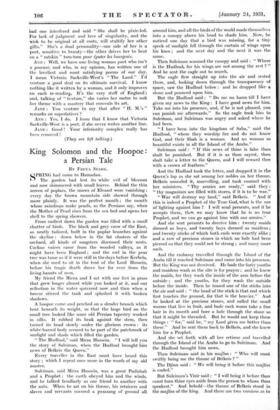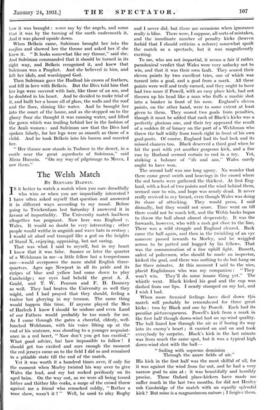King Solomon and the Hoopoe : a Persian Tale
BY FREYA STARK.
SPRING had come to Hamadan. The garden had lost its white veil of blossom and now shimmered with small leaves. Behind the thin screen of poplars, the snows of Elvand were vanishing : every day the brown mountain side showed through more plainly. It was the perfect month ; the month whose raindrops make pearls, so the Persians say, when the Mother of Pearl rises from the sea bed and opens her shell to the spring showers.
From earliest dawn the garden was filled with a small chatter of birds. The black and grey crow of the East, so neatly tailored, built in the poplar branches against the skyline : down below in the fat clusters of the orchard, all kinds of songsters discussed their nests. Cuckoo voices came from the wooded valleys, as it might have been England ; and the owl in the pear tree was tame as if it were still in the days before Kerbela, when she used to sit in the tent of the Lord Hussein, before his tragic death drove her for ever from the living haunts of men.
My friend the Mirza and I sat with our feet in grass that grew longer almost while you looked at it, and our reflection in the water quivered now and then when a breeze stirred the tank and splashed it with broken shadows.
A hoopoe came and perched on a slender branch which bent beneath its weight, so that the large bird on the small tree looked like some old Persian tapestry worked in silks. It rubbed its beak against the stem, then turned its head slowly under the glorious crown : its white-barred body seemed to be part of the patchwork of sunlight and shade which filled the garden.
" The Hudhud," said Mirza Hussein. "I will tell you the story of Suleiman, when the Hudhud brought him news of Belkeis the Queen."
Every traveller in the East must have heard this story ; which I repeat once more in the words of my old master.
Suleiman, said Mirza Hussein, was a great Padishah and a Prophet : the earth obeyed him and the winds, and he talked familiarly as one friend to another with the ants. When he sat on his throne, his retainers and slaves and servants covered- a parasang of ground all around him, and all the birds of the world made themselves into a canopy above his head to shade him. Now, he noticed one day that a bird was missing, for a tiny speck of sunlight fell through the curtain of wings upon his knee ; and the next day and the next it was the • same.
Then Suleiman scanned the canopy and said : " Where is the Hudhudl. for his wings are not among the rest ? And he sent the eagle out to search.
The eagle flew straight up- into the air and rested there, and, looking down through the transparency- of space, saw• the Hudhud- below : - and he dropped like a stone and pounced upon him.
- But the Hudhud said : " Do me no harm till I have given my news to the King : I have good- news for him.. Take me into his presence,. and, if he is not pleased, you can punish me afterwards." So the eagle took him to Suleiman, and Suleiman was angry and asked where he had been.
" I have been into the kingdom of Saba," said the Hudhud, " where they worship fire and do not know God, and their Shah is a woman. And no woman so beautiful exists in all the Island of the Arabs."
Suleiman said : " If this news of thine is. false thou shalt be punished. But if it is as thou sayest, thou shalt take a letter to the Queen, and I will reward thee with a crown of feathers."
And the Hudhud took the letter, and dropped it in the Queen's lap as she sat among her nobles on her throne. Belkeis unsealed it, marvelling, and took counsel with her ministers. " Thy armies are ready," said they "thy magazines are filled with stores, if it is to be war."
" War will destroy my land," said Belkeis. " And if this is indeed a Prophet of the True God, what is the use of fighting against him ? I will send presents, and if he accepts them, then we may know that he is no true Prophet, and we can go against him with our armies."
And she sent presents to deceive him : twenty maids dressed as boys, and twenty boys dressed as maidens ; and twenty sticks of which both ends were exactly alike ; and a row of precious stones in which no hole had been pierced so that they could not be strung ; and many more such.
And the embassy travelled through the Island of the Arabs till it reached Suleiman and came into his presence. But the King was not deceived. He bade the forty youths and maidens wash as the rite is for prayer.; and he knew the maids, for they wash the inside of the arm before the outside ; and the youths, for they wash the outside before the inside. Then he tossed one of the sticks into the air and said : " the head of the stick is that end which first touches the ground, for that is the heavier." And -he looked at the precious stones, and called the small worms that live in fruit, and bade each worm take a fine hair in its mouth and bore a hole_ through the stone so that it might be threaded. But he would not keep these things-: " for," said he, " my Lord gives me better than these." And he sent them back to Belkeis, and she knew him for a Prophet.
And she set forth with all her retinue and travelled through the Island of the Arabs to go to Suleiman. And the Hudhud brought him news.
Then Suleiman said in his majliss : " Who -will most swiftly bring me the throne of Belkeis ? "
The Djinn said : " We will bring it before this majliss is ended."
But Suleiman's Vizir said : " I will bring it before thou canst turn thine eyes aside from the person to whom thou speakest." And behold—the throne of Belkeis stood- in the majliss of- the king. And there are two versions as to how it was brought : some say by the angels, and some that it was by the turning of the earth underneath it. And it was placed upside down.
When Belkeis came, Suleiman brought her " into the majliss and showed her the throne and asked her if she knew it. " It looks somewhat like my throne," said she. And Suleiman commanded that it should be turned in its right way, and Belkeis recognized it, and knew that Suleiman was a Prophet. And she believed in him, and left her idols, and worshipped God.
Then Suleiman gave the Hudhud his crown of feathers, and fell in love with Belkeis. But the Divs told him that her legs were covered with hair, like those of an ass, and he doubted in his heart. And he decided to make trial of it, and built her a house all of glass, the walls and the roof and the floor, shining like water. And he brought her into the court of the house, and as she stepped on to the glassy floor she thought it was running water, and lifted the gown which was trailing behind her in the fashion of the Arab women : and Suleiman saw that the Divs had spoken falsely, for her legs were as smooth as those of a child. And he took Belkeis into his harem and married her.
" Her throne now stands in Tudmor in the desert, in a castle near the great aqueducts of Suleiman," said Mirza Hussein. " On my way of pilgrimage to Mecca, I saw them."







































 Previous page
Previous page